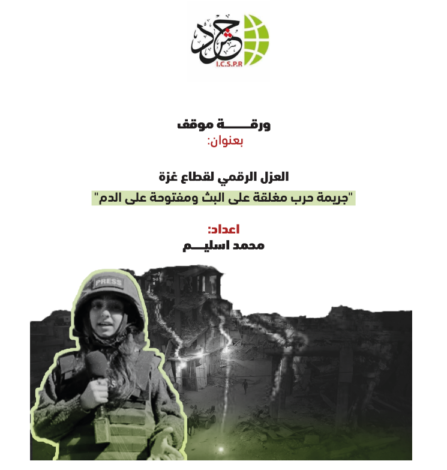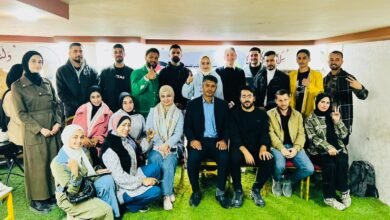
ICSPR Issues a Position Paper Titled “Digital Isolation of the Gaza Strip: A War Crime Closed to Broadcast but Open to Blood”
Date: August 3, 2025
Press Release
ICSPR Issues a Position Paper Titled:
“Digital Isolation of the Gaza Strip: A War Crime Closed to Broadcast but Open to Blood”
The International Commission to Support Palestinian Rights (ICSPR) has issued a legal position paper titled: “Digital Isolation of the Gaza Strip: A War Crime Closed to Broadcast but Open to Blood,” authored by lawyer and legal researcher Mohammad Saleem. The paper comes in the context of documenting and analyzing one of the most alarming aspects of the ongoing Israeli aggression on the Gaza Strip since October 7, 2023, which has not only relied on tools of destruction and killing but has expanded to include a digital blockade aimed at silencing victims and concealing the truth.
Introduction: Open War and Multifaceted Siege
The paper opens by outlining the context of the Israeli military assault on Gaza, described as the most violent in the Strip’s history, accompanied by an unprecedented blockade and direct targeting of civilians and vital infrastructure. It explains that the policy of “digital isolation” has become a new facet of this aggression—used not only as a military tactic but as a tool for media blackout, concealing massacres, and paralyzing humanitarian coordination and documentation efforts, thereby worsening the humanitarian catastrophe and hiding it from global view.
Section One: The Legal Concept of Digital Isolation
The first section defines digital isolation as a systematic behavior that disables communication and media tools during wartime. The paper identifies the following manifestations:
-
Cutting internet and telecom networks.
-
Destroying digital infrastructure.
-
Banning journalists from entering conflict zones.
-
Deleting or restricting Palestinian digital content.
Citing reports by Access Now and Human Rights Watch, the paper categorizes these practices as a form of systematic digital violence.
The paper emphasizes that digital isolation constitutes a flagrant violation of several international legal standards, most notably:
-
The right to freedom of expression and access to information, as guaranteed by the International Covenant on Civil and Political Rights.
-
The right to life and dignity, especially when digital isolation prevents civilians from seeking help or accessing aid.
Section Two: Manifestations of Digital Isolation During the Aggression
The paper documents, through facts and figures, how digital isolation has been implemented in Gaza during the war, highlighting:
-
Six major digital blackouts between October 2023 and June 2025, including a complete outage on October 27–28, 2023, which lasted over 34 hours and was described by NetBlocks as “the worst communication blackout in the history of the Israeli-Palestinian conflict.”
-
Repeated targeting of digital infrastructure, such as telecom towers and service centers, as confirmed by the Palestinian telecom company “Paltel.”
-
The killing of more than 150 journalists and the destruction of over 20 media offices, alongside banning international journalists from entering Gaza except those embedded with Israeli forces.
-
Suppression of Palestinian digital content on platforms like Facebook, Instagram, and YouTube due to Israeli government pressure, as documented by groups such as SMEX and ADRC.
Humanitarian Impact: A Deadly Silence
The paper allocates significant space to the catastrophic humanitarian consequences of digital isolation, including:
-
The paralysis of humanitarian and medical coordination due to disrupted communications.
-
Thousands of families losing contact with loved ones, particularly during bombings in northern Gaza and Rafah.
-
Denial of access to life-saving information such as airstrike alerts or evacuation instructions.
-
Inability to document massacres in real-time, granting the occupation media impunity and control over the narrative.
Section Three: Legal Classification of Digital Isolation as a War Crime and Crime Against Humanity
The paper reclassifies digital isolation not as a technical failure but as a systematic war crime that fulfills the criteria of international criminal law based on:
-
The Geneva Conventions of 1949, which criminalize attacks on civilian infrastructure like broadcast facilities.
-
The First Additional Protocol (1977), which protects communication means during armed conflict.
-
The Rome Statute of the International Criminal Court, which criminalizes the obstruction of justice and concealment of evidence.
Furthermore, the paper argues that digital isolation served as a precursor to acts of genocide, especially when paired with deliberate killing, starvation, and attacks on hospitals and water infrastructure.
Section Four: International Responsibility and Recommendations
The paper holds legal and moral accountability on several fronts:
-
The Israeli occupying power, for implementing this policy as part of a broader military strategy.
-
Major tech companies (Meta, Amazon, Starlink), for failing to protect Palestinian content or enabling the isolation.
-
Western states and Geneva Convention signatories, for remaining silent or complicit in the face of these violations.
Recommendations: An Urgent Call to End Digital Isolation
ICSPR’s paper provides a comprehensive set of legal, political, and technical recommendations, including:
-
Calling on the UN Human Rights Council to open an independent investigation into digital isolation as a war crime.
-
Urging the International Criminal Court to include digital isolation in its ongoing Gaza investigations.
-
Pressuring tech companies to cease suppressing Palestinian content and support alternative digital infrastructure.
-
Promoting civil society initiatives to document digital isolation impacts and amplify victims’ voices.
-
Mobilizing diplomatic efforts to compel Israel to lift the digital blockade as part of ending the broader siege on Gaza.
Conclusion: Digital Isolation as a Weapon of Silent Genocide
The paper concludes by affirming that digital isolation in Gaza is not a random glitch, but a deliberate, structured practice designed to silence victims and facilitate impunity.
ICSPR warns that digital silence is not neutrality—it is complicity, and that protecting digital rights in times of war is no longer a luxury, but a legal and ethical necessity.





